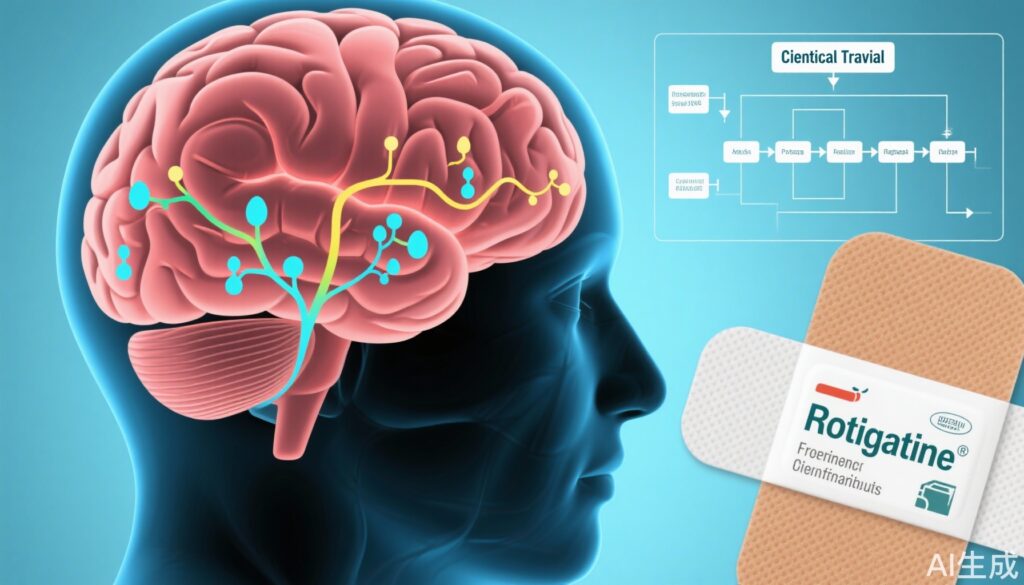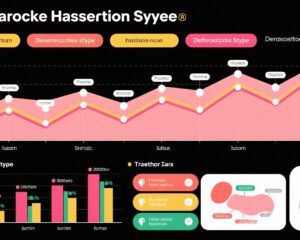Highlights
- Rotigotine, a dopaminergic agonist, was evaluated in a large phase 2 randomized controlled trial for behavioral variant frontotemporal dementia (bvFTD).
- No significant improvement was observed in frontal cognitive function measured by the Frontal Assessment Battery (FAB) compared to placebo after 24 weeks.
- The safety profile was acceptable with mild adverse events more frequent in treatment groups than placebo.
- These findings question the viability of dopaminergic agonist therapy in bvFTD and inform future clinical trial designs.
Background
Frontotemporal dementia (FTD) represents a heterogenous group of neurodegenerative disorders characterized chiefly by progressive frontal and temporal lobe atrophy. The behavioral variant (bvFTD) manifests prominently with changes in personality, executive dysfunction, and behavioral disturbances. Currently, no pharmacological treatments are approved specifically for FTD, posing an unmet medical need. Experimental and clinical data have suggested that dopaminergic neurotransmission deficits may contribute to the pathophysiology of bvFTD, making dopamine receptor agonists like rotigotine potential therapeutic candidates. Rotigotine, delivered via a transdermal patch system, offers continuous dopaminergic stimulation with an established safety record in Parkinson’s disease. This study explored rotigotine’s clinical impact on frontal cognitive function and behavioral symptoms in bvFTD.
Key Content
Study Design and Patient Population
A phase IIa, double-blind, placebo-controlled trial was conducted across multiple centers in Italy from June 2021 to April 2023. Seventy-five patients with probable bvFTD were randomized (1:1:1) to three arms: rotigotine 4 mg/24h, rotigotine 6 mg/24h, or placebo, administered as transdermal patches over 24 weeks. Randomization utilized a double-blind covariate-adaptive scheme and the primary efficacy analysis was performed on the intention-to-treat population.
Outcome Measures
The primary endpoint was the change from baseline to 24 weeks in the Frontal Assessment Battery (FAB), a validated measure of executive function sensitive to frontal lobe deterioration. Secondary endpoints included assessments for global cognition, functional decline, and behavioral symptomatology.
Findings
Among 128 screened participants, 75 were enrolled, with a mean age of 66.5 years and 41% female representation. The completion rate was high at 92%. The primary outcome showed no statistically significant benefit of rotigotine over placebo on FAB scores. Specifically, the estimated mean change at 24 weeks was 0.18 (95% CI -0.79 to 1.15) for rotigotine 4 mg, 0.89 (95% CI -0.09 to 1.88) for rotigotine 6 mg, and 1.08 (95% CI 0.19 to 1.98) for placebo. Comparing rotigotine doses to placebo yielded nonsignificant differences (p=0.18 and 0.77, respectively). Similarly, secondary outcomes revealed no therapeutic advantage.
Adverse events were generally mild, more commonly reported in rotigotine groups (4 mg: 16%; 6 mg: 12%) than placebo (4%). No severe safety concerns emerged.
Contextualizing with Existing Evidence
Prior studies on dopaminergic therapies in bvFTD have been limited, often small and inconclusive. The present trial, one of the largest to date, reinforces the complexity of modulating dopaminergic transmission in a heterogeneous neurodegenerative condition. Possible explanations include the multifaceted neurotransmitter deficits in FTD beyond dopamine, varying dopaminergic receptor subtype involvement, or insufficient therapeutic exposure duration.
Expert Commentary
This trial provides a rigorous, well-powered evaluation of rotigotine in bvFTD but fails to demonstrate clinical efficacy. The negative results emphasize the need to rethink dopaminergic strategies or to identify better biomarkers for patient stratification and target engagement. The trial’s methodological strengths include centralized randomization, double-blinding, and high retention. Nevertheless, the heterogeneous nature of bvFTD pathophysiology and clinical presentation limits the likelihood that a single dopamine agonist will yield broad benefits.
Biologically, dopaminergic deficits identified in FTD may reflect downstream neurodegeneration or compensatory changes rather than primary therapeutic targets. Additionally, motor symptoms responsive to dopaminergic agents are uncommon in bvFTD, possibly explaining the lack of functional improvement. Future studies might explore combinatorial or multi-target approaches impacting other neurochemical systems such as serotonergic or glutamatergic pathways.
Current clinical guidelines do not recommend dopaminergic agonists for bvFTD, consistent with these findings. This work importantly provides a benchmark dataset for designing future trials with novel agents and illustrates challenges in repurposing therapies from Parkinson’s to FTD.
Conclusion
Rotigotine, administered at doses of 4 mg and 6 mg via transdermal patch over 24 weeks, did not confer meaningful improvements in frontal cognitive function or behavior in patients with behavioral variant frontotemporal dementia. The treatment was safe and well tolerated but demonstrated no efficacy advantage over placebo. These results suggest that while dopaminergic impairment is present in bvFTD, targeting it with rotigotine does not translate into clinical benefit. Ongoing research must focus on elucidating underlying mechanisms and identifying novel therapeutic targets to address the unmet medical need in FTD.
References
- Koch G, Assogna M, Gadola Y, Alberici A, Di Lorenzo F, Bonnì S, et al. Safety and efficacy of rotigotine in patients with frontotemporal dementia: a phase 2, double-blind, randomized, placebo-controlled, multicenter trial. Lancet Reg Health Eur. 2025 Aug 5;57:101409. doi:10.1016/j.lanepe.2025.101409. PMID: 40809903; PMCID: PMC12344256.
- Bang J, Spina S, Miller BL. Frontotemporal dementia. Lancet. 2015 Oct 24;386(10004):1672-82. doi:10.1016/S0140-6736(15)00461-4. PMID: 26515643.
- Rascovsky K, Hodges JR, Knopman D, Mendez MF, Kramer JH, Neuhaus J, et al. Sensitivity of revised diagnostic criteria for the behavioural variant of frontotemporal dementia. Brain. 2011 Sep;134(Pt 9):2456-77. doi:10.1093/brain/awr179. PMID: 21795617.



